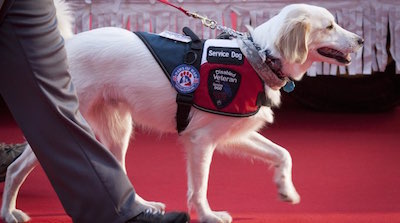Canine News You Can Use
Service Dog Facts for the General Public and Businesses

True Service Dog?
You may be considering having your dog trained as a service dog. You may have seen someone with a dog wearing a service dog vest outside or in a store. I was recently at a Walmart and I observed what appeared to be a mother and son entering the store. The son had a German Shepherd (or mix) on a leash, no vest indicating the animal was a service dog, and the dog seemed to be pulling him along at times. I asked the greeter if that was a service dog, and the response was, “We’re not allowed to ask, according to Walmart policy and our training.”
The greeter was partially correct, but I will get to that in a minute. Here are a few important things you should know about the service dog world:
(1) Service dog public access is allowed by law through the ADA (Americans with Disabilities Act). Click here for ADA.
(2) Service dogs are individually trained to do work or perform tasks for people with disabilities, related to the disability. This one usually throws people for a loop, in that there are also therapy and emotional support dogs, but they are NOT covered under the ADA. If you want to bring Fluffy into the Big River Grille indoor dining area because he makes you feel happy, sorry, that is not a trained task (even if he can smile on command). An obvious example of a true service dog is a guide dog for a blind person. There are also dogs that have been trained to alert to low or high blood sugar events. Some service dogs are trained to open doors or drawers, turn on lights, and pick up items. Calming a person with Post Traumatic Stress Disorder (PTSD) during an anxiety attack is covered under the ADA (the service dog is still trained to perform a specific task during the anxiety attack; the dog’s mere presence does not constitute a task).
(3) An individual may train his or her dog to perform the specific task(s), or a person may hire a trainer or training organization to do the training. One key point is that not all dogs can be trained to become service dogs. Although most dogs can be trained to perform a task, the dog’s temperament is just as important as the task it performs. For instance, if the dog is reactive (barking, growling, lunging, etc.) around crowds or other dogs or strollers or “whatever,” it can be denied public access. Another key point is that some tasks, like detection of a low or high blood sugar event, are highly specialized. Most dog owners will not have the skills and experience to train their own dog for this type of task.
(4) Just because a dog is wearing a “Service Dog” vest, does not mean it is a legitimate service dog. Google “Service Dog Certification” and you will receive a wide variety of organizations that “register” your dog as a service animal with that particular organization, and can provide you with ID cards, patches, certificates, vests, and other stuff… for a price, of course. Although these items make the dog look very official, by law, none are required and the ADA does not require a certification/registration.
(5) OK, so what can a business ask of a person walking into the establishment? The Walmart employee was incorrect when stating that they cannot ask any questions (although this may be the company policy), but they are limited as to what they may ask. This is from the ADA.gov web site:
“When it is not obvious what service an animal provides, only limited inquiries are allowed. Staff may ask two questions: (1) is the dog a service animal required because of a disability, and (2) what work or task has the dog been trained to perform. Staff cannot ask about the person’s disability, require medical documentation, require a special identification card or training documentation for the dog, or ask that the dog demonstrate its ability to perform the work or task.”
This is a good report from a few years ago that describes the purpose of service dogs, and problems with fake ones.
The general public and businesses in particular should be knowledgeable on the basics of public access for service dogs. If you own a business, or you know someone who owns a business, I would be happy to help them and/or their employees become more knowledgeable about service dogs. Contact me via text or voice at 423-991-8655, or send me an email at: jeff@bluebridgedogtraining.com
Have you seen a “suspicious looking” service dog around town? Let us know on Facebook: Service Dogs
Breaking Through Barriers, Transforming Lives...
Jeff
